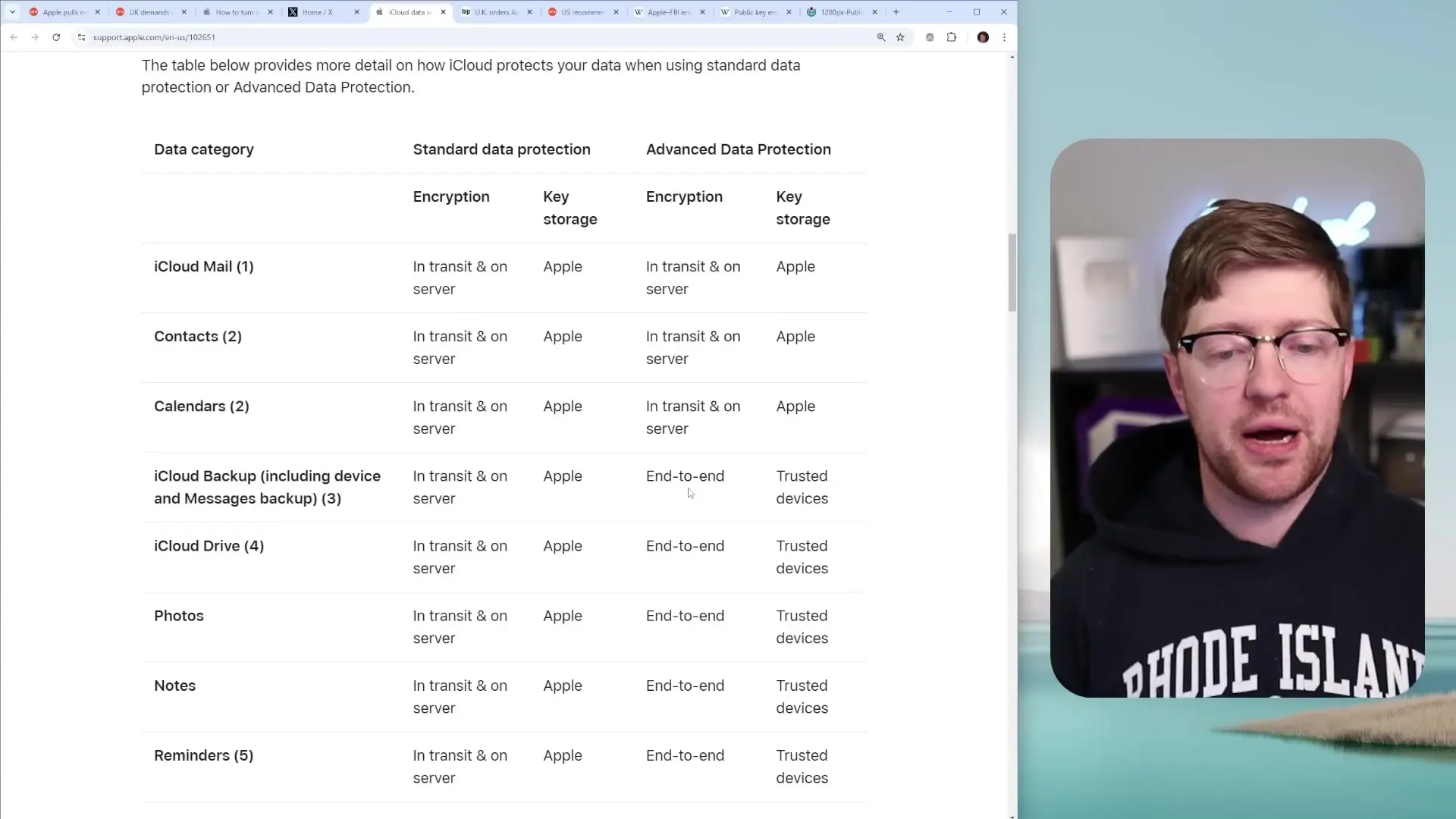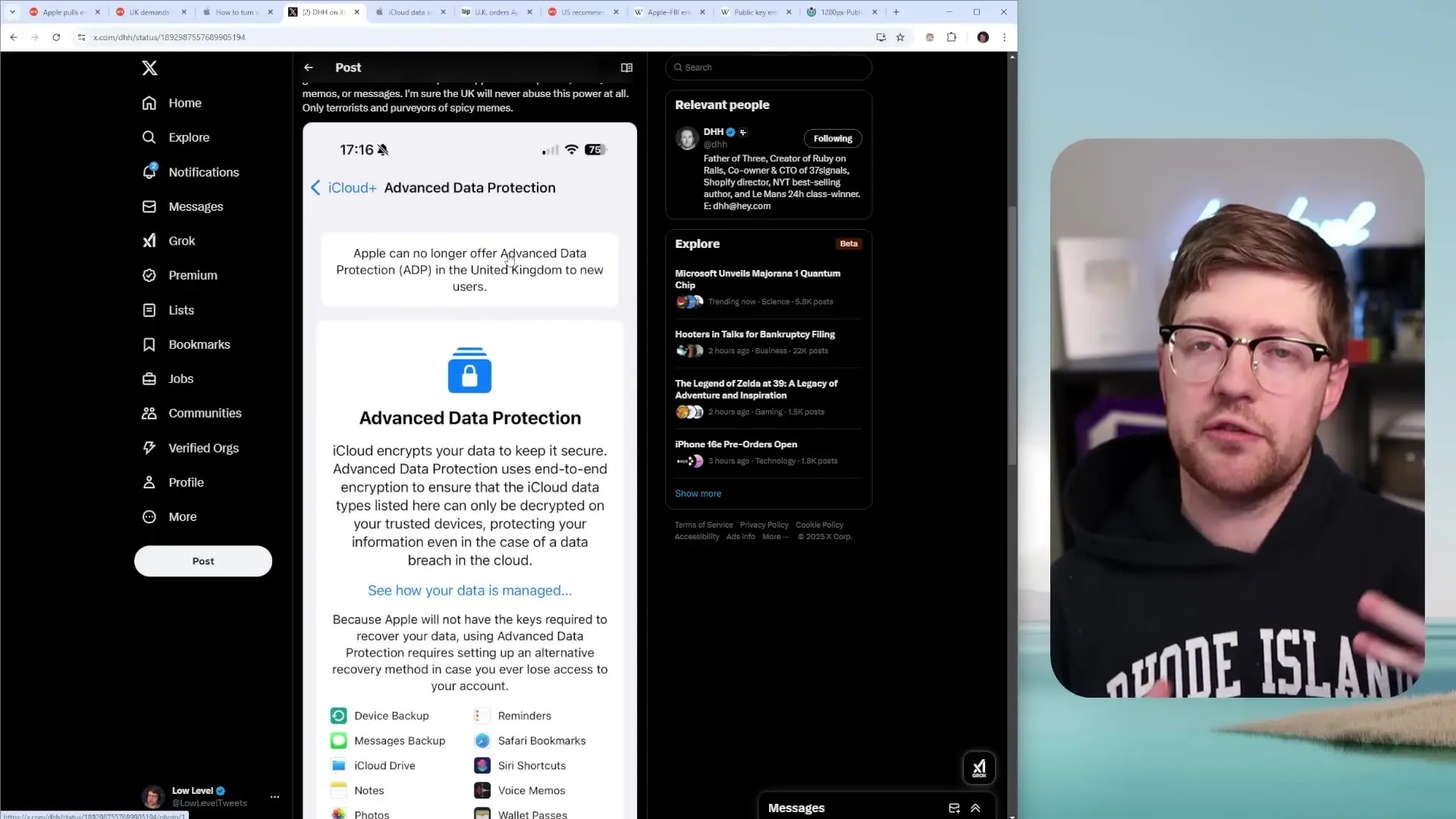
In a significant development for digital privacy, Apple has disabled its end-to-end encryption feature for iCloud users in the United Kingdom. This decision comes in response to governmental pressure requiring backdoor access to encrypted user data. Rather than compromising the security of all users by creating such backdoors, Apple opted to completely disable the Advanced Data Protection (ADP) feature in the region.
Understanding iCloud End-to-End Encryption and Advanced Data Protection
Apple's Advanced Data Protection is a security feature that provides end-to-end encryption for data stored in iCloud. Under standard encryption methods, data is encrypted when stored, but the service provider (Apple) maintains access to the encryption keys. This creates two potential vulnerabilities: the provider could access your data if compelled to, or hackers who compromise the cloud service could potentially access the keys and decrypt your information.
End-to-end encryption, on the other hand, uses public key cryptography where only the user holds the private decryption key. This means even Apple cannot access the encrypted data, as the decryption keys are securely stored in hardware enclaves on the user's device rather than in the cloud.

The UK Government's Demands and Apple's Response
According to reports initially published by The Washington Post, the UK government issued a confidential order to Apple demanding the creation of a backdoor that would allow government officials to access encrypted data. Such orders typically come with legal restrictions that prevent recipients from publicly discussing them.
Faced with this demand, Apple had two options: create a backdoor that would fundamentally compromise the security of its encryption system globally, or disable the Advanced Data Protection feature for UK users. Apple chose the latter, prioritizing the overall integrity of its security architecture while complying with local regulations.
Confirmation of the Feature Removal
The removal of Advanced Data Protection in the UK was confirmed when users began noticing its absence in their iCloud+ settings. David Heinemeier Hansson (creator of Ruby on Rails) publicly shared screenshots showing that the ADP feature was no longer available for UK users, with previously encrypted data now stored with keys that Apple—and potentially the UK government—could access.

The Broader Context: Government Tensions with Encryption
This is not the first confrontation between technology companies and governments over encryption. In 2015-2016, following the San Bernardino shooting, the FBI requested that Apple create software to bypass security features on the shooter's iPhone. Apple refused, citing concerns about being compelled to create backdoors that would undermine device security for all users. Eventually, the FBI found a third-party solution to access the device.
What makes the current situation particularly notable is the apparent contradiction in government positions on encryption. While the UK government is demanding backdoor access to encrypted communications, US security agencies including the FBI, NSA, and CISA recently urged citizens to use end-to-end encrypted messaging applications following the discovery that Chinese hackers had penetrated multiple US telecommunications providers.
The Security Paradox
This creates a paradox: the same encryption technology that governments want to weaken for law enforcement purposes is simultaneously recognized as essential protection against foreign threat actors. Security experts consistently maintain that creating backdoors for one party inevitably creates vulnerabilities that can be exploited by others.
What This Means for iCloud Users in the UK
For users in the United Kingdom, the implications are clear: data stored in iCloud is now less secure than it would be with Advanced Data Protection enabled. While standard encryption still protects against casual hackers, it does not provide the same level of protection against access by Apple or government entities with legal authority to request data.
- Photos, notes, messages, and other sensitive data stored in iCloud are now encrypted with keys that Apple maintains access to
- UK users no longer have the option to enable end-to-end encryption via Advanced Data Protection
- Previously encrypted data under ADP now reverts to standard encryption with keys accessible to Apple
- Legal requests from UK authorities for user data can now potentially be fulfilled by Apple
Potential Alternatives for Privacy-Conscious Users
Users concerned about the privacy implications of this change have several options to consider:
- Use local device backups instead of iCloud for sensitive data
- Consider third-party end-to-end encrypted cloud storage solutions
- Utilize encrypted messaging apps that maintain end-to-end encryption by default
- Minimize the amount of sensitive data stored in cloud services altogether
- For those with technical knowledge, implement personal encryption before uploading data to any cloud service
The Slippery Slope of Encryption Backdoors
The fundamental concern with government-mandated backdoors in encryption systems is the potential for expanded surveillance beyond the originally stated purposes. While preventing terrorism and serious crime are often cited as justifications, privacy advocates warn of mission creep where surveillance capabilities expand to monitor political dissidents, journalists, or other lawful activities.
Additionally, creating backdoors fundamentally weakens security for all users. As cryptography experts often note, you cannot create a backdoor that only the "good guys" can use—any intentional weakness in an encryption system can potentially be discovered and exploited by malicious actors.
Will Other Countries Follow the UK's Lead?
The UK's move raises questions about whether other countries might follow suit with similar demands. Australia has already implemented controversial anti-encryption laws, and there have been ongoing debates in the United States and European Union about encryption regulations. This could potentially lead to a fragmented global landscape where privacy protections vary significantly by region.
For global companies like Apple, navigating these conflicting regulatory requirements while maintaining user trust presents an increasingly complex challenge. Apple's decision to disable features rather than implement backdoors represents one approach to this dilemma, but it remains to be seen how sustainable this strategy will be if more countries make similar demands.
Conclusion: The Ongoing Battle Between Privacy and Security
Apple's decision to disable end-to-end encryption in the UK rather than create backdoors highlights the ongoing tension between privacy, security, and government access. While governments argue that access to encrypted communications is necessary for national security and law enforcement, privacy advocates and security experts maintain that weakening encryption ultimately makes everyone less secure.
As digital privacy becomes increasingly important in our connected world, these debates will likely intensify. For now, users should stay informed about the encryption capabilities of their cloud services and make deliberate choices about where and how they store sensitive information.
Let's Watch!
Apple Disables iCloud End-to-End Encryption in UK: What This Means for Your Privacy
Ready to enhance your neural network?
Access our quantum knowledge cores and upgrade your programming abilities.
Initialize Training Sequence